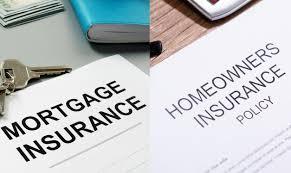Imagine you are about to buy homeowners insurance for your home and you are presented with two options: mortgage vs. homeowners insurance. Which one would you choose?
To avoid making mistakes and dispel any misconceptions you may have regarding mortgage vs homeowners insurance, it is critical that you gain a thorough understanding of the two types of insurance and what they cover.
Here’s the basic difference. Homeowners insurance protects your home and its contents. Mortgage insurance protects your mortgage lender in case you can’t meet your mortgage payments.
This is the reason this article has been composed, to help you gain a better understanding so you can make an informed decision when the need be.
What is mortgage insurance
Mortgage insurance, sometimes known as mortgage grantee or home loan insurance, is a type of insurance policy that protects a mortgage lender or titleholder in the event that the borrower defaults on payments, dies, or is otherwise unable to complete the mortgage’s contractual obligations.
It is a type of insurance that protects investors in a mortgage-backed asset from losses caused by a mortgage loan default.
Mortgage insurance is available in public or private forms, depending on the insurer, and its coverage is also known as mortgage indemnity guarantee. (MIG.)
Mortgage insurance does not safeguard your financial interest in your home; rather, it protects the lender if you default on your mortgage payments.
What are the types of mortgage insurance
There are basically three types of mortgage insurance. They include:
- Private mortgage insurance (PMI)
- Qualified mortgage insurance premium
- Mortgage title insurance
Private Mortgage Insurance (PMI)
Private mortgage insurance (PMI) is a type of mortgage insurance that a borrower may be forced to pay as a condition of receiving a traditional mortgage loan.
PMI, like other types of mortgage insurance, is designed to protect the lender rather than the borrower.
Private mortgage insurance is provided by private insurance companies, however it is arranged by the lender.
Qualified Mortgage Insurance Premium (MIP)
The Federal Housing Administration (FHA) is a government agency that insures mortgages for licensed lenders by paying a borrower’s debts if he defaults.
When your mortgage is backed by the FHA, you will have to pay a qualified mortgage insurance premium, which is equivalent to the FHA’s insurance.
Regardless of their down payment, everyone with an FHA mortgage is required to purchase MIP insurance.
Mortgage Title Insurance
Mortgage title insurance prevents you from losing money if a sale is later canceled due to a title problem. It protects a beneficiary from financial loss if it is discovered at the time of the sale that the property is owned by someone other than the seller.
A title search is performed by a representative, such as a lawyer or a title business employee, prior to the mortgage closing.
The purpose of the procedure is to discover any liens imposed on the property that would prevent the owner from selling it.
A title search also ensures that the property being sold is the seller’s. If information is not consolidated, it is easy to miss significant pieces of evidence despite a comprehensive search.
When Is Mortgage Insurance Required?
When you take out a mortgage loan and your down payment is less than 20% of the purchase price, you may be forced to obtain mortgage insurance.
The need for mortgage insurance varies depending on the lender and loan package.
Some lenders, depending on your circumstances, may allow you to avoid PMI even if you put down a lower down payment.
Ask your lender if PMI is necessary, and if so, if there are any exceptions to the rule that you might be eligible for.
How much does mortgage insurance cost?
The cost of mortgage insurance depends on three factors:
- The loan amount,
- Your credit score,
- Your loan-to-value (LTV) ratio.
PMI fees typically range from 0.58 percent to 1.86 percent of the original loan amount, with up to an extra $70 in monthly costs for every $100,000 borrowed.
The monthly cost for a $250,000 property ranges from $1,091 to $1,747. PMI is usually included in the monthly mortgage payment, but it can also be paid in one lump sum at closing.
PMI terms are spelled out in detail in your loan estimate and closing disclosure.
Private insurance companies supply PMI, which is negotiated by the lender. A lender may or may not provide you with payment options, but you have the right to ask for them.
The following are the most popular ways to pay for PMI:
- Monthly premium added to your mortgage payment
- One-time upfront premium paid at closing
- Combination of one upfront payment and monthly premiums
Mortgage insurance covers the lender and it is required for a borrower making a lower down payment, usually less than 20% of the home’s purchase price.
The payment system is on a monthly basis; the borrower pays monthly payments and or a portion of closing costs of a home purchase to the mortgage insurer set by the lender.
Why is mortgage insurance important?
Mortgage insurance helps you on the path to becoming a home owner as quickly as feasible.
Although paying the monthly premium, also known as PMI, may seem inconvenient.
Most people would have to wait years to save up for a larger down payment before being able to purchase their homes, time that could have been better spent investing in their homes rather than paying rent and dues to a landlord on a monthly basis.
Another advantage is that you are not obligated to keep your PMI; you can easily cancel it.
In other words, you are not obligated to pay the additional amount indefinitely; it is a one-time expenditure that may be associated with a very lengthy rewards.
Homeowners Insurance
What is homeowners insurance?
Homeowners insurance is a type of property insurance that covers losses and damages to a person’s home, as well as their belongings and other assets.
Liability coverage is included in homeowner’s insurance for accidents that occur in the home or on the property.
It covers you financially if your home and/or possessions are damaged or destroyed. Fires, tornadoes, explosions, and riots are all examples of this.
What is covered in homeowners insurance policy?
Fences, sheds, plants, and trees are all covered by standard home insurance policies.
A homes insurance policy typically covers four types of occurrences that occur on the insured property: interior damage, outside damage, loss or damage to personal assets/belongings, and injury while on the property.
When a claim is filed for any of these events, the homeowner will be required to pay a deductible, which is the insured’s out-of-pocket expense.
When Is Homeowners Insurance Required?
Anyone who takes out a mortgage loan to buy a house is usually required to have homeowner’s insurance.
After you have paid off your mortgage, you will almost certainly want to keep your homeowners insurance policy.
While your mortgage lender can no longer compel you to carry house insurance once you pay off your mortgage, it’s up to you to protect your investment.
What are the other coverage types within home insurance?
Liability Coverage: Covers injuries and property damage you accidentally do to others. Liability insurance also pays your legal fees if you’re sued over a situation that’s covered by the policy.
Medical payments to others: Pays out for small injuries to guests on your property, whether or not you’re legally liable for them.
Additional Living Expenses Coverage: If you’re unable to live at home due to damage covered by the policy, additional living expense coverage pays your extra expenses such as hotel and laundry bills.
Mortgage vs homeowners insurance; what are the key differences?
If your property is stolen or damaged, your homeowner’s insurance will compensate you (house or possessions).
Mortgage insurance, on the other hand, compensates your lender if you default on your loan.
The type of insurance you need if you have a mortgage is determined by how you pay for the house.
Mortgage vs homeowners purchase requirements
Purchase of homeowner’s insurance is required. If you borrowed money to buy the house, lenders will almost always need you to carry homeowners insurance before they will pay the loan.
It is a good idea to have your homeowners insurance policy even after you have paid off your mortgage.
The coverage will protect you from financial loss if something happens to your home or goods, even if it is not required at this time.
Mortgage insurance purchase requirement.
While you may be required to purchase homeowners insurance, you can usually avoid mortgage insurance if you put down 20% or more of the property’s appraised value.
A lender will require different types of mortgage insurance depending on the type of loan you apply for.
Home Insurance Vs. Mortgage Insurance Payments
Home insurance payments:
Homeowners insurance and mortgage payments are occasionally combined into a single payment. Some lenders demand that you open an escrow account.
The money is usually collected as part of your mortgage payment, placed in an escrow account, and then paid to your house insurance carrier on your behalf.
Mortgage insurance payments:
Are made in one of two ways, depending on the type of loan you have.
If you must purchase PMI, your lender may offer you the option of making an upfront payment or making monthly contributions to your mortgage.
Conclusion:
In order to become a homeowner, you will need both homeowners and mortgage insurance.
Even if the services and coverage offered by each varies, homeowners insurance is required for effective protection of your property, even if your mortgage has been paid off.
Mortgage insurance is an excellent approach to help you become a homeowner in a short period of time if you do not already own a property.
If you still want to protect your house, homeowners insurance will give you more coverage.






